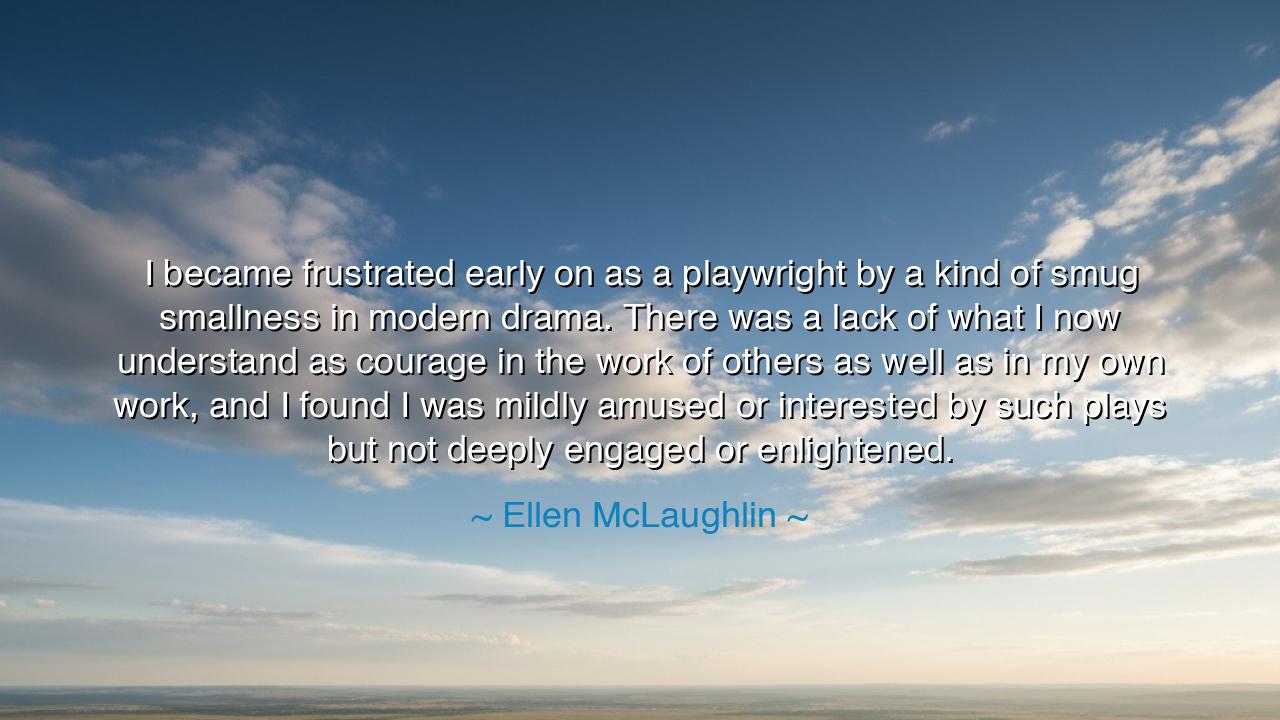
I became frustrated early on as a playwright by a kind of smug
I became frustrated early on as a playwright by a kind of smug smallness in modern drama. There was a lack of what I now understand as courage in the work of others as well as in my own work, and I found I was mildly amused or interested by such plays but not deeply engaged or enlightened.






“I became frustrated early on as a playwright by a kind of smug smallness in modern drama. There was a lack of what I now understand as courage in the work of others as well as in my own work, and I found I was mildly amused or interested by such plays but not deeply engaged or enlightened.” — Thus spoke Ellen McLaughlin, playwright, actor, and interpreter of ancient myths for the modern world. Her words resound with the lament of an artist who has glimpsed the heights of the human spirit, yet finds herself surrounded by works that dare not ascend them. In her voice, we hear the call for courage in art — that sacred fire which transforms mere entertainment into revelation, and turns stories from idle diversions into vessels of truth.
McLaughlin’s frustration was not born of disdain for her peers, but of longing — longing for the depth and grandeur once found in the dramas of antiquity. In the old theaters of Greece, tragedy was not a pastime; it was a ritual, a confrontation with the divine and the mortal, the light and the shadow within the soul. Aeschylus, Sophocles, Euripides — these playwrights wrote not to amuse, but to awaken. Their words were a mirror in which citizens saw their own passions, their pride, their frailty. Yet in the modern age, McLaughlin saw that much of drama had become small, concerned more with cleverness than truth, with irony rather than awe. The playwrights of her time, she believed, had lost the courage to speak of what truly mattered — of grief, guilt, redemption, and the sacred mystery of being human.
What she calls the “smug smallness” of modern drama is not a lack of skill, but a lack of vision. It is the comfort of the mind that plays safely within the familiar, avoiding the dangerous questions that lie at the heart of existence. The artist who fears to offend, to fail, or to feel too deeply becomes a craftsman of clever surfaces — capable of amusing, but incapable of enlightening. McLaughlin’s insight reminds us that art without risk becomes sterile, and that drama without moral courage loses the power to pierce the human heart. The great playwrights — from Shakespeare to Brecht, from Lorca to Miller — were unafraid to drag the audience into darkness so that they might emerge into light.
Consider the example of Sophocles’ Antigone, that immortal heroine who defied the decree of her king to honor the unwritten laws of conscience. Her tragedy still echoes across centuries because it is born of moral courage — the willingness to stand for truth against power, to risk destruction in the name of what is right. McLaughlin herself reimagined Antigone and other Greek dramas in her own plays, seeking to revive that lost grandeur of feeling and intellect. She saw that the ancients wrote not for applause, but for catharsis — the purging of the soul through confrontation with fate and virtue. To her, modern drama’s retreat from such themes was a retreat from greatness itself.
The courage McLaughlin speaks of is not only artistic but spiritual. It is the bravery to tell stories that cut close to the bone, to reveal the wounds and contradictions that polite society would rather hide. Such courage demands humility — for the artist must first confront her own fears, her own mediocrity, before she can guide others through theirs. To write with courage is to bleed upon the page; to act with courage is to stand naked before the audience and the gods. This is why she admits that she found the same lack of bravery in her own work — for true courage is a rare and sacred flame, hard to kindle and harder still to sustain.
McLaughlin’s lament is, in truth, a challenge to all who create — not only playwrights, but thinkers, leaders, and dreamers. In every field, there exists the temptation to settle for smallness, to choose comfort over confrontation, to polish rather than probe. Yet greatness, whether in art or life, demands the opposite. It demands that we face the chaos within and speak of it plainly. For it is only through such authentic engagement that we move beyond amusement into enlightenment. The purpose of art, as she reminds us, is not to distract from life, but to transform it.
The lesson, then, is this: be courageous in your craft, in your thoughts, in your living. Whatever you create — a poem, a speech, a relationship, or a legacy — let it not be small and smug, but daring and true. Risk failure rather than live safely in mediocrity. Seek not to merely entertain, but to engage, to enlighten, to awaken something eternal in those who encounter your work. For in every age, it is the brave — not the comfortable — who shape the soul of humanity.
So remember, my child: the artist’s duty, like that of the philosopher and the hero, is not to soothe, but to stir. Do not fear to reach into the depths of the human condition, for it is there that beauty and truth dwell. Write, speak, live with courage, and your work, like McLaughlin’s, may yet join the timeless chorus of those who dared to make the human spirit tremble — and, in trembling, be made whole.






AAdministratorAdministrator
Welcome, honored guests. Please leave a comment, we will respond soon